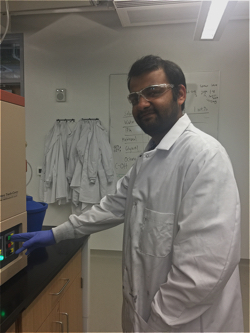A mechanical engineering Ph.D. student will spend two weeks using some the most advanced X-ray and neutron equipment in the world and learning the techniques from top experts.
Marm Dixit was among 60 graduate students selected for the 2017 National School on Neutron and X-ray Scattering. As a part of this program he will spend one week at Oak Ridge National Lab and one week at Argonne National lab, all expenses paid.
Argonne National Lab’s Advanced Photon Source and Oak Ridge National Laboratory’s Spallation Neutron Source and High Flux Isotope Reactor allow nanoscale study of advanced materials and interactions.

Dixit works in the Inks and Interfaces group, which studies complex material systems for 3D printing, manufacturing, and energy applications. The group’s focus is obtaining fundamental insights into the feedstock materials or “inks” used to manufacture energy storage (batteries) and conversion (fuel cell) systems.
“These inks are multi-component suspensions with significant dynamics that govern the eventual device performance. The carbon-based inks are essentially ‘dark’ matter in the sense that conventional methods of examining them don’t work,” Dixit said.
The high-powered x-rays and neutrons allow him and other researchers to probe ink samples to get valuable information about their structure without damaging them.
Only a handful of synchrotrons and neutron sources exist in the world, said Kelsey B. Hatzell, an assistant professor in mechanical and chemical engineering and Dixit’s advisor.
“This program is for exceptional graduate students and it enables them to work and learn synchrotron characterization techniques from leading scientists and experts,” she said. “This program will accelerate Marm’s growing expertise and puts him in a very elite pool of students.”
Dixit is new to the School of Engineering, starting here this year. He worked as a junior research fellow at the Energy Systems Research Laboratory, Indian Institute of Technology Gandhinagar from 2013-16. His undergraduate degree in mechanical engineering is from Charotar University of Science and Technology, Gujarat, India.